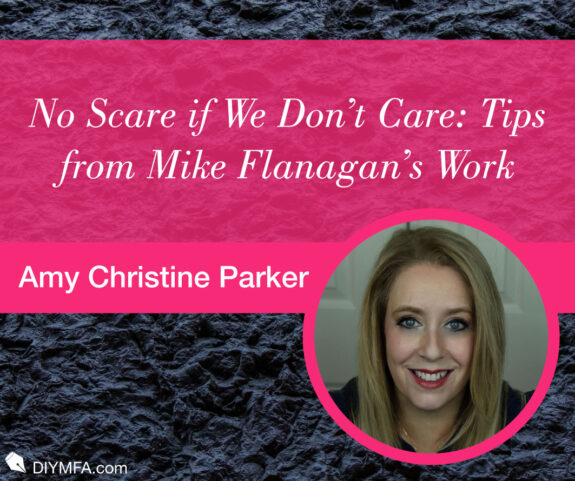If plot is the skin and bones of a story, then character is its beating heart. A story isn’t truly alive until the characters it is about are compelling and real, raw with want, and propelled by desires shaped by their past experiences. This is true in all genres, no less for thriller and horror novels. But how do you go about making characters feel real enough for readers to become swept up by them?
By studying the masters in the field.
Right now, one of those masters is Mike Flanagan, the writer and director of such hits as Hush, Gerald’s Game, Doctor Sleep, The Haunting of Hill House, Midnight Mass, and most recently The Fall of the House of Usher. One of the things he does best is develop characters who feel like people we know—or are ourselves. In my opinion, character is what he puts the most emphasis on in his stories and it’s the key to his success which is why I have watched and rewatched his movies and television series, taking copious notes along the way. Here are three things I’ve learned about character by studying him.
Characters Should be Haunted by Something.
I don’t mean physically—although in a Flanagan story this is always true as well, but in a psychological/spiritual sense. One of the most effective ways to make a character complex is to give them a history rife with dark events and personal relationships scarred by trauma. In Flanagan’s work, there is always a tightly interwoven dual plotline of confronting supernatural fear simultaneously with relationship-based fear. His characters have wounds inflicted on them by others (or that they have inflicted on themselves or others) that must be confronted and healed if they’re to survive whatever supernatural opponent they face.
A good example of this type of character development can be found in The Haunting of Hill House. The plot alternates between the present and the past, closely following the Crain children who famously lived in a haunted house decades ago, fleeing one night after leaving one of their family members behind who does not survive. The experience of living there affects each of them very differently but in equally profound ways. How they cope with the death of that loved one, and the truth of what happened in the house shapes their relationships with each other into their adulthood. The adult children are just as haunted as their younger counterparts, but mostly by their inability to relate to one another or reconcile the hurts they each experienced at the hands of each other and the ghosts they faced. Each child is vividly wrought, their reactions so psychologically accurate that it’s impossible not to get swept up in the horror surrounding them.
Characters Need Ethical Dilemmas
Giving all characters, even your heroes a certain amount of moral ambiguity can be very effective in the horror genre, especially if it leads to redemption. Characters who grapple with blurred ethical boundaries and moral quandaries that don’t have clear cut solutions are riveting because they are enigmatic—the reader can’t easily predict what they are going to do. As a result, they can’t put the book down. What is the right choice? Would the reader make the same decision the character does if they were in their shoes? The uncertainty/lack of an obvious answer adds tension and unpredictability to a narrative.
Riley and Father Pruitt from Midnight Mass are both excellent examples of characters with moral grayness. Riley’s struggle to figure out how to return to his life after being incarcerated for killing a young girl in a drunk driving accident is compelling. Here is a character in need of redemption—someone who, by all accounts, does not have the makings of a hero. And yet, his personal guilt and the way he’s haunted by what he’s done draws viewers in, making them care deeply for him despite his awful wrongdoing. When he’s faced with a supernatural evil twisted to look good, we have to know if he’s strong enough and brave enough to do what’s right. Father Pruitt, on the other hand, is a revered priest who seems on the surface to be the example of morality—but who is actively grappling with the temptation to take his fate—and that of his congregation and the people he loves most—into his own hands even if doing so means deceiving himself and everyone else about what is good and true. Both of their struggles with their faith and morality engender empathy and unease while underscoring the show’s spiritual themes. If you watch only one of Mike Flanagan’s shows/movies, this is the one I recommend most for character study. It’s horror with so much heart I dare you not to cry.
Characters Need Hidden and Not So Hidden Vulnerabilities.
For us to be drawn to a character, we need them to be relatable. The best way to achieve this is by giving them insecurities and fears that reveal themselves over the course of the story. These aspects of character make them more vulnerable and three-dimensional, like us. A mix of obvious fears and insecurities with more hidden ones gives characters depth. It elevates conflicts when those insecurities/vulnerabilities are in direct opposition to what the character needs to do to overcome it.
Flanagan utilizes this technique to great effect in the movie, Gerald’s Game, based on Stephen King’s novel by the same name. This is a story many people thought could not be made into a film because it’s basically about a woman who is stuck handcuffed to a bed after a tryst with her husband goes wrong and he ends up dead. Almost the entire movie takes place in the bedroom of a remote vacation home with just one character who can’t move. It’s a story that rests wholly on the main character, Jessie, a seemingly submissive woman who must find a way to escape her bonds or else die slowly alone in the house—well, maybe not completely alone. Jessie’s predicament is awful—a true nightmare—and one that she can’t escape without facing some awful truths about her past and who she’s allowed herself to become and as a result, something she comes to grips with over the course of the movie. Revelations are doled out one by one, at a pace so unsettling the movie is a psychological nail-biter.
Mastering the art of creating complex characters in the horror/thriller genres is essential for creating stories intense enough to grab the reader and never let go. If we don’t care, there’s no scare. We must be invested in the survival of the people on the page. By studying experts at character development like Mike Flanagan, we can learn to craft characters of our own who leave a lasting impression in our readers’ minds, people they love long after they reach the words, the end.

Amy Christine Parker is the critically acclaimed author of the thrillers Gated, Astray, Smash & Grab, and Flight 171.
You can find her on her website and follow her on Facebook and Instagram.







